Vanessa Shields's Blog, page 20
November 19, 2021
Poem 322 – Ocean, for Lisa
Ocean, For Lisa
words float between us
because we are an ocean of listening
between us an ocean opens
we float on the words love & kindness
because they are rafts of sanctuary
when the ocean swells like our eyes with tears
& we frighten a bit when the lid on the sugar bowl
shifts – the listening touches shores we can’t see
but we can feel because that is what vulnerability
does: teaches us how to be oceans of ears
how love & kindness fills us up like sugar bowls
because everywhere containers wait for our
vulnerable openings
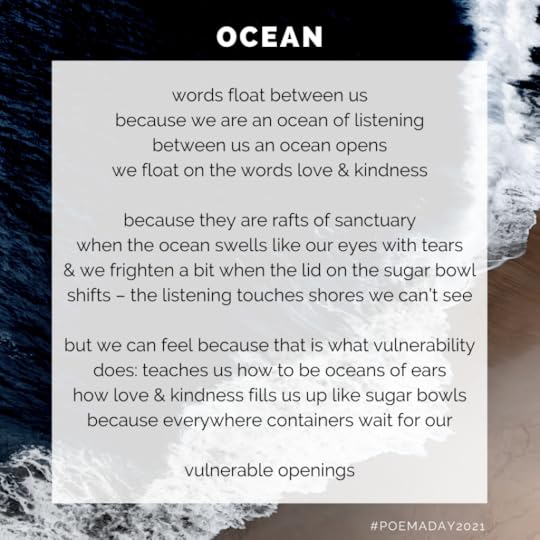
Thank you, Lisa, for giving me three words for today’s poem: love, kindness, vulnerability. Thank you for sharing with me.
November 18, 2021
Poem 322 – Three Sakes
Three Sakes
1
I could take you to the very place but I won’t
it is thick here, heavy-curtained by blush insulation
I pull my palms down them, needing the sensation
of shard sharpness to burrow into my palms
prickling pain keeping me in my body
2
This person – a veil
thin, mildly see-through
w/ short skinny limbs like half-breathed thoughts
dishevelled hair as burnt as a November leaf in its final grasp
3
And in the end, when the vehicle smacked its left side into the thick, barky belly of the majestic Maple stationed like a soldier in front of his yellow-brick ranch on the lazy lane in the common collection of 1960’s built subdivision homes he’d always hated but endured for everyone’s sake but his own – the vision was delivered.
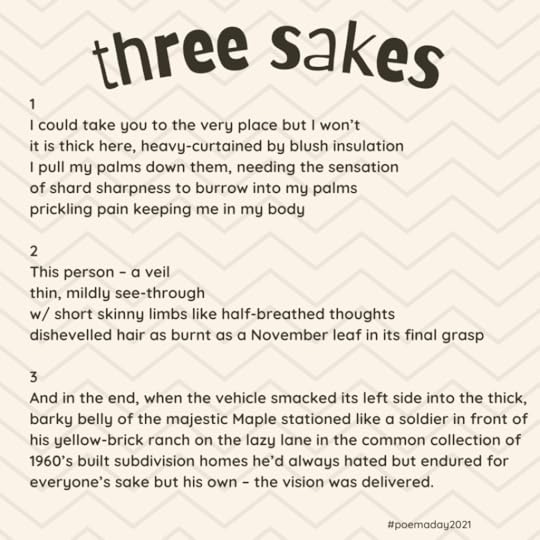
These three pieces were written during our Yin Writing practice this morning. I was thinking about beginnings, middles and endings. Each one is based on a prompt:
Beginning: A paragraph from the book ‘ The Merry Heart, Reflections on Reading, Writing and The World of Books’ by Robertson Davies. The prompt is part of a line from the paragraph on page 139, I could take you to the very place….Middle: On page 22, A paragraph describing, Demi, one of the boys in ‘ Little Men ‘, the third instalment in the Little Women series written by Louisa May Alcott. The prompt was to describe a person. End: Start and ending with the words: And in the end.We wrote for five minutes for each prompt. Thank you, writers, for joining me this morning!
November 17, 2021
Poem 321 – November Leaves
November Leaves, for Emmy
Really, it’s not up to leaves alone to fall
it is a collective agreement
by November life becomes about
what to hold onto & how
life becomes a story of precision maintenance
in preparation for an ultimate letting go
an understanding of the shift into a quiet
deeper existence for a time
& so leaves do what they do best in November
express – in their plight to absorb energy
chaos ensues & the damage speaks
in screams of colours beyond green
the ouch of yellow
the burn of orange
the rage of red
the spectrum of destruction is an outburst
& the tender truth of it all is that these slaps
of brightness were there all along
cradled in the grrr of green
& even though the fall is imminent
the whole process is simply
an exquisite exercise in recovery
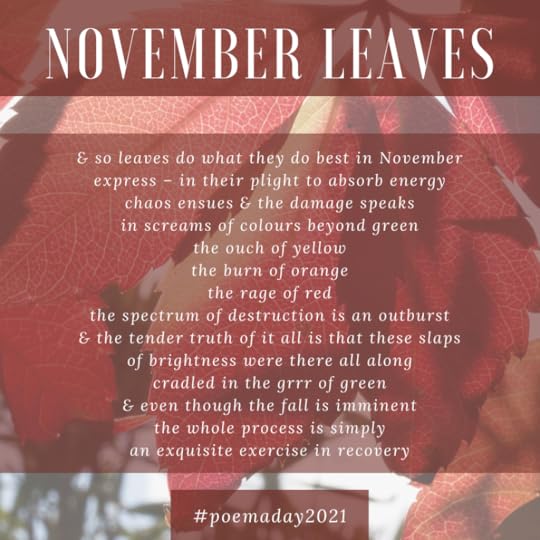
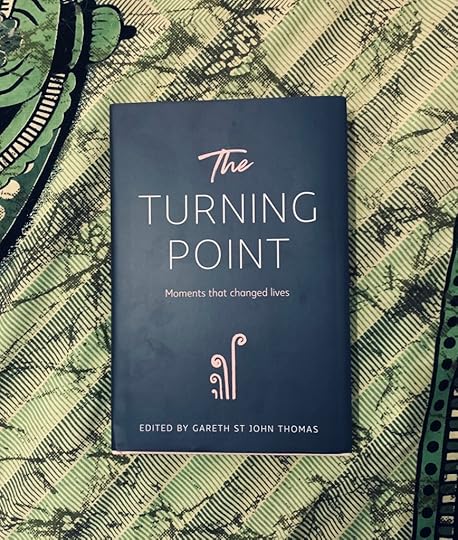
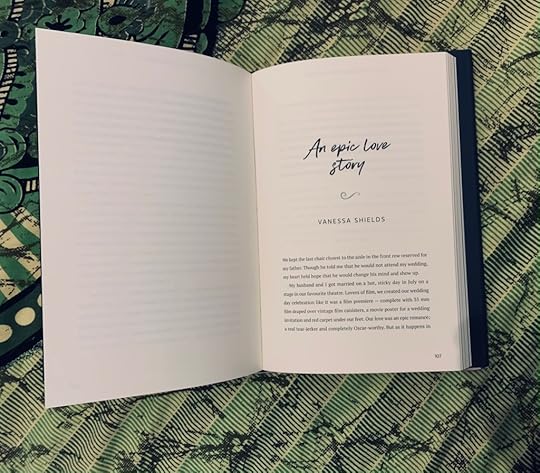
Thank you to the family at Exisle Publishing for including my essay entitled ‘An Epic Love Story’ in their latest publication Turning Point. Congratulations to the many other contributors whose stories each are about poignant turning points in their lives.
Special Guest Writer Richard Scarsbrook! Author of ‘The Troupers’
 Richard Scarsbrook’s newest novel, The Troupers (Cormorant Books)
Richard Scarsbrook’s newest novel, The Troupers (Cormorant Books) I met Richard Scarsbrook through BookFest Windsor many moons ago. He was a guest speaker for the youth writing contest winners at their award event. We connected before the event so I could get to know him a bit and introduce him to the kids, nervous and excited, sitting in the theatre. From the beginning, Richard was enthusiastic, authentic and passionate – he continues to be!
In 2017, he was a guest author on this very blog for his then newly released book, Apocalypse One Hundred. Scarsbrook is a prolific writer, his works spanning genres. Poetry, plays, screenplays, fiction (short and novels!) – he lives and breathes words. He has served as Writer in Residence for the Toronto District School Board, and the Orangeville, Richmond Hill, and Toronto Public Libraries. He also teaches creative writing at George Brown College and The Humber School for Writers.
To date, he has published ten books, including the novels The Troupers, The Indifference League, the National Post Bestseller Rockets Versus Gravity, and The Monkeyface Chronicles, which won the 2011 OLA White Pine Award. His short stories and poems have also appeared in The Guardian, The Los Angeles Times, Descant, Existere, Prairie Fire, and NeWest Review, amongst many others. His first produced screenplay, Royal Blood, was an official selection at many international film festivals, and won Best Short Film at the TIFF-associated Milton Film Festival.
I recently finished reading The Troupers, and so, the following interview questions were born. Richard was kind enough to answer them all! I highly recommend The Troupers – it is entertaining in a moving way that stirs up your insides. It’s fascination with and dedication to the Silver Screen is commendable, so anyone who loves old movies will love this story. The characters are real and sad and hopeful, and Richard’s clever wit dips into the dark in a way still makes room for the light.
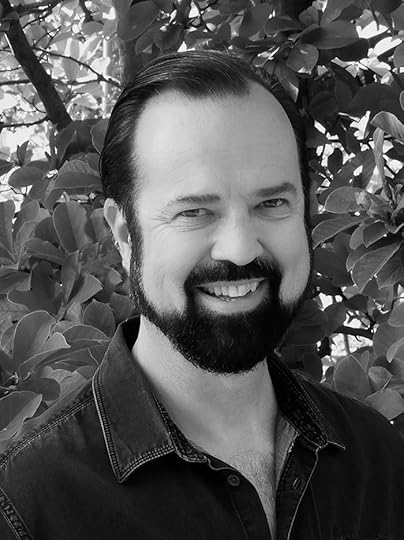
VS: One of the things I really appreciate about The Troupers (Cormorant Books) is its Canadian soul, if you will. I love that its location is the iconic and world-wonder ‘Niagara Falls’. Tell us how you came to choose this location as the base for the story.
RS: The setting for The Troupers evolved significantly as I was revising the story. Initially, I set the story in Faireville, the fictional small town that is the setting (or at least one of them) in most of my other novels, and originally the Trouper family’s theatre was a regional gem something like Victoria Hall in Petrolia, Ontario. However, as the story evolved, it became apparent that a more “entertainment-centric” location would serve the evolution of the characters and their stories better, and the circus-like atmosphere of Clifton Hill in Niagara Falls seemed like an ideal location for the fictional Trouper-Royale Orpheum-Galaxie Theatre.
I liked the contrast between the pretentious faux-grandeur of John Lionel Trouper’s inherited theatre and its flashy, noisy, carnival surroundings, and I also thought it would be entertaining for the wannabe “Great Director” to be painfully aware of the world-renowned Shaw Festival right up the road in quaint, movie-set-perfect Niagara-on-the-Lake. The Orpheum-Galaxie Theatre and its Clifton Hill location came to represent John Lionel Trouper’s deeply flawed narcissism, his desperate longing for glory and grandeur.
The Orpheum-Galaxie Theatre and its Clifton Hill location came to represent John Lionel Trouper’s deeply flawed narcissism, his desperate longing for glory and grandeur.
VS: There’s a darkness in the The Troupers that at times made me feel uncomfortable – which I don’t mind at all, it’s a feat to be able to do that as a writer! – but layered in the darkness are these brilliant zings of humour. In tone and language and action, you’ve infused humour to smooth out and allow for breathing space for the reader. Where does this writing skill come from?
RS: I’ve recognised just recently – after ten books, if you can believe it – that the space between hilarity and heartbreak is where almost all of my stories have chosen to live, and, as a result, walking that tightrope line between humour and pathos, for better or for worse, is the position that I usually find myself writing from.
RS: I’ve recognised just recently – after ten books, if you can believe it – that the space between hilarity and heartbreak is where almost all of my stories have chosen to live, and, as a result, walking that tightrope line between humour and pathos, for better or for worse, is the position that I usually find myself writing from. Finding the drama (or tragedy) inside the comedy, or the comedy inside the drama (or tragedy), has been a principal element in just about every novel, story, or poem that I’ve ever written.
I really appreciate your insightful comment that “there’s a darkness in The Troupers that at times made me feel uncomfortable”, because I think that our natural human response to darkness is discomfort (or fear, or rage, or disbelief, depending on how truly dark the darkness is), and that one of our best natural defense mechanisms against discomfort is laughter. In some situations, we immediately react by laughing; we can extinguish that darkness on the spot by shining the light of humour upon it. In other circumstances, we can eventually laugh; the passage of time can sometimes be the bringer of the light. But there are other times in our lives that we experience the sort of darkness that will always remain dark, and I think it’s important for my fictional people, and their worlds, and their stories, to reflect these varying shades of light and dark.
VS: Golly, you know a lot about films/entertainment pre-1950! From iconic actors to daring directors to film quotes (I too am ready for my close-up, Mr. Demille!) – did you already have a passion for the era of entertainment or did you do a tonne of research (or both?) to make the era of the golden age of film, essentially, its own character in the book? (This is a question about ‘research’…important/necessary/bunk? thoughts?)
RS: I was fortunate to be brought up by parents who loved classic films; every Saturday evening, my dad’s after-dinner refrain was inevitably, “What’s on Elwy?”, referring to Elwy Yost, the host of TV Ontario’s Magic Shadows, and Saturday Night at the Movies. As a result, I saw a lot of classic movies during my formative years. Then I met my partner Danielle, who is a huge fan of Bette Davis, Joan Crawford, Ava Gardner, and other iconic Golden Age actresses, and Danielle had watched a lot of late-night, deep-cut films on Turner Classic Movies that I just had to see, too. Even our four-year-old daughter is as likely to choose to watch The Wizard of Oz or An American in Paris as Paw Patrol, so I’ve always been and continue to be surrounded by classic films.
Although I have seen every film mentioned in The Troupers at one time or another, to get some details right I did re-watch and take notes on several movies that are key to the story, from the early Little Rascals films that influence the Trouper quintuplets during their formative years, to Grand Hotel, after whose stars John Lionel Trouper has been named by his showgirl mother, to especially The Women, which is particularly important to the story’s climactic scene!
VS: How long did it take you to write this book – from that zinging first idea to the final draft headed to proofing?
RS: I generally finish a new book about every two years – while I’m doing the final edits on one book, I’m usually thinking seriously about how the next one is going to play out – but this one took closer to four years, for a very good reason; the day before the launch party for my last novel, Rockets Versus Gravity, we found out that we were going to have our daughter Vivienne, who was born shortly after the release of my last poetry collection, Apocalypse One Hundred. She is an absolutely fantastic little person, and she delights us every day, so temporarily slowing down a bit to enjoy and participate fully in her formative years was one of the best experiences I’ve ever had.
VS: Where do your ideas come from? How do you manage them?
RS: I think when you decide that you’re a writer, or a creator of any kind, a program switches on inside your brain that scans for potential creative ideas while you’re just living your life, and then the ideas that stick, the ones that don’t get automatically deleted from the hard drive after a few days, the ones that whisper and then shout “create me… CREATE ME!!!” in the middle of the night… those are the ideas the you chase after, sometimes for years, until your finally catch up with them.
…the ones that whisper and then shout “create me… CREATE ME!!!” in the middle of the night… those are the ideas the you chase after, sometimes for years, until your finally catch up with them.
I had the idea for The Troupers for several years before I started writing it, after watching a documentary about the Dionne Quintuplets and then another about the life of Charlie Chaplin, I think. Similarly, the idea for the book I’m working on right now, The Girl Who Could Not Die, began with an article about the ownership of genetic codes that I read at least five years ago. The story ideas that stay with me the longest are the ones that I eventually catch up with and write.
VS: *Personal question alert!* Are any of the experiences that the Trouper children experienced part of your own history?
RS: Well, the Trouper quintuplets are controlled with maniacal fervour by their narcissistic father, John Lionel Trouper, who wants to mould them into the Dionne Quintuplets of the Stage, for his own personal directorial glory, while my own parents are decent, unselfish, hard-working, down-to-earth people, who encouraged their children to become whatever we wanted to become… so my experiences in that respect were not much like the Trouper children at all.
However, I suppose I do have one thing in common with the Trouper kids – the stage. There was a phase in my life when I was regularly acting (and occasionally directing) with a very well-run, talent-filled community theatre group, and I’ve witnessed first-hand how the stage lights can bring out the BIGGEST elements of many actors’ natural personalities. For of my friends in this particular group, the personality-amplifying effect of the stage was often impressive and inspiring… but it makes for a better story, I think, when the stage serves to amplify the drama and conflict instead.
VS: This is a very play-ful novel. From the actual plays that take place in the story to the formatting shifts in layout and design, can you talk about the relationship between the story, the characters, the format/space on the page?
RS: That is just the sort of great question I would expect from a poet, because the spacial aspect of the format changes in the story was quite intentional.
FYI for readers that haven’t yet read The Troupers, the scenes that take place onstage are written in playscript format, and those that occur on TV or film are in screenplay format.
FYI for readers that haven’t yet read The Troupers, the scenes that take place onstage are written in playscript format, and those that occur on TV or film are in screenplay format.
I felt that using these stylistic changes visually contributed to the reader’s (and the characters’ own) awareness that they are onstage or in front of a camera, while also stylistically emphasizing and focusing upon the drama or humour within these scenes.
VS: Is there a playwright inside of you? Or a budding filmmaker?
RS: I have been pushing my way into the screenwriting business for a while now. My first produced screenplay, Royal Blood, was an official selection at many international film festivals, and won Best Short Film at the TIFF-associated Milton Film Festival. I’ve also written a TV series pilot based on my novel The Monkeyface Chronicles, feature film screenplays from The Indifference League and The Girl Who Could Not Die, and I’ll likely get to work soon on transforming The Troupers into a screenplay as well. All any of these projects need now are Executive Producers with the money to make them!
VS: Of all the members of the Trouper family, which one would you want to hang out with, and why?
RS: If I could get in a fictional time machine and travel back to New York City in 1929, I feel like young Chrysanthemum Trouper (the Trouper Quintuplets’ matriarch grandmother) would be a whole lot of fun to hang out with. I mean, she had just escaped from her parents’ music hall act in London, England, stowed away aboard a ship, and invented a new name for herself to become a dancer at the Ziegfeld Follies… how could she not be fun?
VS: Your chapters have titles…and subtitles. Was this part of your original manuscript or did this formatting choice come later in the process?
RS: The chapter titles and subtitles are definitely part of the original MS! I like titles a lot, and the effect they can have on the story each chapter tells. A good title sets up a certain expectation in the mind of the reader, which can then be rewarded – or thwarted. A good title can add another dimension to the story.
A good title sets up a certain expectation in the mind of the reader, which can then be rewarded – or thwarted. A good title can add another dimension to the story.
Also, more subtly, perhaps, the title / subtitle for each chapter was meant to reflect the title cards that were often used in silent films.
VS: What is your favourite part of being a writer?
RS: All of it! I enjoy the writing process itself, from chasing after the original idea that will drive the story, to discovering all the details that will make the characters full, believable human beings, to planning out all of a story’s twists and turns, to revising and editing the story over and over again until it becomes the best version of itself that I can make it.
Then, when all of those things are accomplished, I also enjoy getting out there and helping the book find its readers – doing interviews like this one, reading and talking at festivals and other events, meeting and exchanging ideas with other readers and writers – I love it all.
VS: What advice would NOT give aspiring writers. Lol. I’m being cheeky. You can answer it…or you can elaborate on ‘advice for aspiring writers’. 
RS: Expect immediate fame and fortune! If your literary genius isn’t recognized and heralded immediately and unanimously, you should throw a spectacular public tantrum, burn all of your manuscripts is a furious rage, and then go sulk in a corner, drinking absinthe and mumbling misquotes from Frederich Nietzsche. And don’t forget to post the videos of all of this on your social media channels!
VS: What book(s) are you reading right now?
RS: I just finished reading Terry Fallis’s latest novel, Operation Angus, which was a super fun read like all of Terry’s books are, and Thimbles by Vanessa Shields, a collection of poems that tell a beautiful and heartbreaking story. Also, the evocative Wide Sargasso Sea by Jean Rhys, and the mind-bending Stories of Your Life and Others by Ted Chiang. Next, I’ll be digging into some of this fall’s award-nominated titles. So many great books, so little time!
VS: What film have you watched most recently?
RS: My first trip back to the theatre in a long time (thanks, COVID) was to see Dune, which was as visually impressive as you would expect from a Denis Villeneuve film. I loved his Blade Runner 2049 and especially Arrival (which was based on the title story from Ted Chaing’s collection, noted above); Villeneuve would be my dream director for a Sci Fi novel/screenplay I’m working on called The Girl Who Could Not Die.
I was also lucky enough to see a Somalian film called The Gravedigger’s Wife in an actual theatre at TIFF this year; although it was a bit strange to see a festival movie in an auditorium at one-quarter capacity, it was a mesmerizing film that I whole-heartedly recommend seeing, and the opportunity to listen to the director and actors talk about making the movie really added to the experience.
Our next movie date will be The French Dispatch by Wes Anderson, which I’m sure we will love. (Wes Anderson would be my dream director for The Troupers, by the way.)
To stay connected with Richard, follow him on Facebook, Instagram, and Twitter.
His website is HERE.
Thank you, Richard! Keep up the amazing work!
November 16, 2021
Poem 320 – Meet Me – An Ode to Holiday Hims
Meet me – An Ode To Holiday Hims
in St. Louis, Seattle, LA, Manhattan or England – I’ll fly around the globe for this:
fill my dance card with names
George Bailey
Bob Wallace
Phil Davis
Clark Griswald
Everett Stone
Chris (The Transvestite)
John McClane
Edward Scissorhands (carefully)
Joe Fox/Sam Baldwin (two birds, one dance)
Jack Frost
Mr. Grinch (after his heart grew three sizes larger)
Rudolph, Charlie, Buddy, Scrooge, Kermit and Frosty too
I’d do a jig with Ralphie and Kevin….
and though the last dance
belongs to Theodore Laurence
my heart belongs to March
Jo March

November 15, 2021
Poem 319 – Longlist – Erasure Poetry
Longlist – Erasure poetry
message – Literary reply > com > shield
dear vanessa
you are receiving because you unveiled the morning
and you view the writers who are running
the winner isn’t on the list this year
we hope that you keep in mind that
readers change so
feel free to visit books for inspiration
your writing can connect and support
in entering
be open original
look to your work again with regards
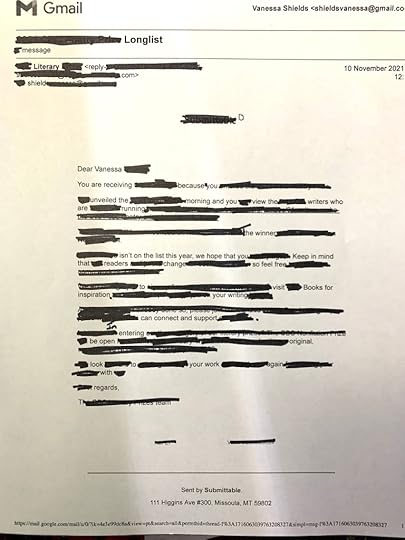
Erasure (or blackout) poetry’s intention is to create poetry by erasing (or blacking out) text/imagery from an existing collection of words/images; for example: letters, articles, and other poetry. Shout out to Jeni De La O for the inspiration (saw her example on @jenidelao on twitter). Also, thank you to CBC Literary Prizes team for the rejection letter.
November 14, 2021
Poem 318 – Be Patient Haiku
Be Patient – Haiku
it is not ready
this inner murmuration
a seed unfurling

November 13, 2021
Poem 317 – Around the Table
around the table
we gathered felt our stories lifting lilting tilting into each other’s smiles inhaled the glory of common motivations inspirations that shape-shifted like the characters we attempted to contain embraced the soundtrack of fingertips on keyboards the orchestra of self-expression intersecting with trumpet-laughter jazz yellow daisies alive & listening petal pranced across the divine lines of our creative crops magic husks
splaying
birthing
audacious
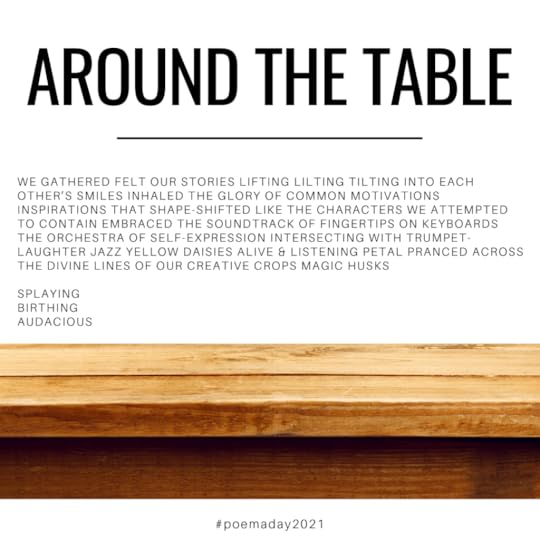

Thank you!
To the brave, inspiring, hard-working and passionate writers who shared the writing room today! It was a wonderful day filled with poetry, prose, laughter, light and love!
November 12, 2021
Poem 316 – This Child
This Child, for Miller
This child’s face is a library of stories
she leaves me pages of poses
on my cell phone to find when I’m weary
& in need of the light only she can shine
This child’s laughter is a palace
she leads me to secret rooms filled with treasures
to discover when I’m low in faith
& in need of letting go
This child’s spirit is a galaxy
she pours stardust in paths before me
so each step I take is with her
toward the impossible

November 11, 2021
Poem 315 – Souffle
Soufflé
The wind whipped into 3pm
clouds cheek-puffed & grey
but I – I was writing before
the light moved to meet the day
by noon the words flowed
between mouths into laughter
we even read poetry out loud
Pope & Lowell – pausing in the
eleventh hour to hand-over-heart
silence as three yellow spitfires
sputtered overhead –
remembering lives in all the colours
By 1pm the dream was so massive
a fat band of pain knocked
under my skull & brought stars
to the dark in my blinks
then after sushi & dishes
the love was uncontainable
& I realized the knocking
against my skull was the
pain of joy
so passionately robust
it felt lethal
Hot rose & eucalyptus water
soothed my body into bliss
calm collected contemplative
When the words revisited
in slow kisses I offered my
rib cage – souffléd upward
my heart bloomed to bursting




